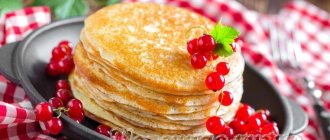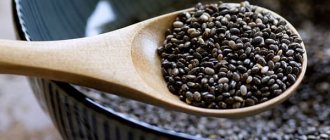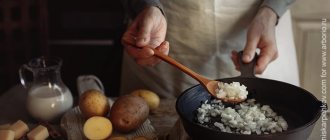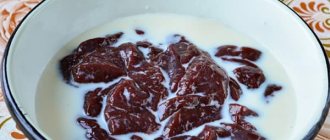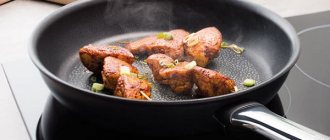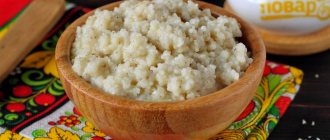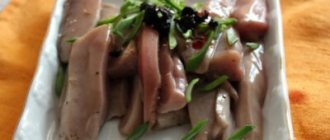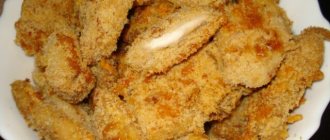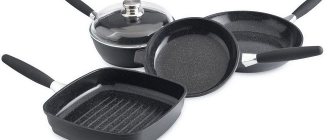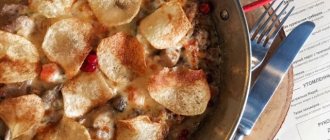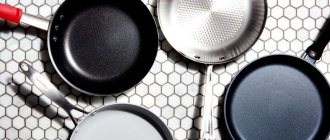The first pancake is lumpy - not such a rare occurrence. True, often the first is followed by a second, a third... They stick together, tear, stick, burn... Both a novice housewife and an experienced one can encounter such a problem, because this problem does not have one single cause. If pancakes stick to the pan, it is important to know all the reasons in order to understand exactly how to act in each case.
Why do pancakes stick to the pan?
So, there is far more than one reason here. What could it be? That:
- the dough has an inappropriate consistency;
- pancakes were made according to a recipe with incorrect proportions of ingredients;
- the housewife took a new frying pan;
- the frying pan has a damaged coating;
- the pan is not heated properly;
- not enough oil.
Most often, the problem arises when the dough is prepared “by eye”, trusting your experience. This should not be done, because the consequence of using such a recipe is often the most unpleasant: the pancakes do not come off the pan.
Problems with the recipe
What points in the pancake recipe can be violated?
- The amount of flour (it is what is responsible for the consistency).
- Soda.
- Eggs.
- Sugar.
- Oil.
So, flour.
Its quantity and quality make the dough thicker or thinner. Too thick will result in thick, rough pancakes that can burn and stick as they cook through their entire thickness. If the mass turns out to be liquid, the pancakes come out too thin, so they tear when you try to turn them over or remove them. Why does this sometimes happen, even if the recipe is followed exactly? Because they take a different type of flour. It has a different percentage of gluten, so with the same amount of liquid it can produce a thicker or thinner mixture.
How to fix it? In the first case, you need to add the liquid with which the dough was kneaded. It can be milk or water, kefir or mineral water. In the second, add flour and beat the dough with a whisk to break up any lumps that have formed. Ideally, you should end up with a mass whose thickness is approximately between kefir and sour cream.
Soda. If there is too much of it, the pancakes become so loose that they simply fall apart when you try to turn them over. If the pancakes “puff up”, gathering in folds, it means there is definitely a lot of soda. To reduce its concentration, you will have to increase the total volume of the test. That is, dilute another portion, just do not add soda to it, and mix it with the first.
We recommend: Making a bath mat with your own hands
Eggs. Their lack in the dough affects not only the appearance of the pancakes - they look pale and unappetizing. The eggs are tied and the ingredients are glued together. When the viscosity is sufficient, the dough particles “stick to each other” during baking, so they lag behind the pan. Otherwise, the pan attracts them with a stronger force than the one they are connected to. As a result, they stick to the pan so much that it is not always possible to clean them off without effort. If adding an egg to the mixture saved the situation, it means that the dough lacked viscosity.
Sugar. As you know, sugar begins to caramelize at high temperatures. And the greater its concentration in the dough, the stronger the pancake sticks during frying - it’s as if it’s melted to the pan by burning sugar. Therefore, you need to put it in the mixture for baking pancakes in a minimal amount or not at all, but serve honey, jam or other sweets as an addition to them.
Oil. If this ingredient is missing from the pancake recipe, there is a high risk that they will stick and burn to the pan, since it is the oil that creates a natural layer between the dough layer and the metal, eliminating their direct contact.
During cooking, the frying pan also needs to be greased with oil. At least for the first pancake.
Lubricate not only the bottom, but also the side surfaces of the frying pan, because dough is often poured onto them too. The pancake may not come off precisely because it is stuck to the side.
General recommendations
Mastering the art of baking delicate and beautiful pancakes is not so difficult. The main thing is to find a suitable recipe and strictly follow all the recommendations:
- Products for preparing pancake dough must be at room temperature; the necessary ingredients must be taken out of the refrigerator in advance;
- You need to grease both the bottom of the pan and its sides with oil;
- The dough should be of optimal consistency: not too thick, like pancakes, but not completely liquid;
- When baking, the pancake base needs to be stirred periodically.
Why do pancakes made with kefir and milk stick?
Kefir makes pancakes unusually tender and thin. But that is why they are often difficult to remove. For baking to go smoothly, you need to cook them in a thoroughly washed and dry frying pan, turn them over with the thinnest spatula, and be sure to add vegetable oil to the baking mixture.
Pancakes made with milk can stick for two reasons: either the milk is too thick, or it was not very fresh and during the cooking process it began to sour right in the dough. In the first option, you need to dilute the milk with water in a 1:1 ratio (or add water to the finished dough). In the second, neutralize the formed acid. To do this, add a little soda and flour to the mass, and also slightly dilute it with boiling water.
Always cook pancakes with the freshest milk to avoid this problem. Then you won't have to fix anything.
Incorrect dough consistency
The result largely depends on the consistency of the dough. Thick and dense pancakes are obtained with a thick mixture. A completely liquid dough will cause the pancakes to stick to the pan as the water evaporates and become brittle and dry.
By adding flour, milk or water you can avoid problems. To prevent lumps from forming during mixing, the milk and water should be warm. If these ingredients turn out to be hot, the taste of the pancakes will deteriorate.
The consistency of the finished dough should be thinner than sour cream, and thicker than kefir.
Recipe for pancakes that don't stick to the pan
To make perfect pancakes you will need:
- first or highest grade flour - 2 cups;
- granulated sugar – 1.5 tbsp. spoons;
- chicken eggs – 3 pcs.;
- Sunflower oil – 2 tbsp. spoons;
- medium fat milk – 1 glass;
- sparkling mineral water – 2 glasses;
- salt – 1 teaspoon.
We recommend: Is it possible to wash a crystal chandelier without removing it from the ceiling?
Warm milk is poured into a bowl, mineral water is added. Gradually add the sifted flour and stir to break up the lumps. Then add the remaining ingredients and beat with a mixer. Now the dough should “walk” for about 15 minutes. After this, you need to stir it again with a whisk - and you can bake.
A lot of sugar
If there is too much sugar, the pancakes can also burn. 2-3 tbsp. 1 liter of dough is enough - it’s better to serve sweeter toppings later.
This can only be corrected by increasing the amount of dough. Dilute another portion without sugar and combine with the one that is too sweet. If you get a lot of pancakes, just freeze the rest. And such “reserves” can be stored for several months!
Big or small fire
Pancakes also stick when the fire on which they are fried is too strong or too weak. There is no way to do this without practice, because everyone’s stoves and hobs are different. The fire should be medium, if it is a gas stove, then a divider will not hurt. On an electric one you will have to adapt.
Experts advise not to bake on a large-diameter burner - the center does not have time to fry and the sides burn. It won’t work on the smallest one either - the middle will have time to burn, and the sides won’t even brown yet.
What's wrong with the frying pan?
Quite a lot depends on the frying pan. If everything is in order with the dough, but the pancakes still stick, then it’s the problem.
Problems may include:
- a new, just purchased frying pan was used;
- the housewife simply exchanged one household frying pan for another;
- used utensils with a damaged coating: scratches, chips, soot, unevenness;
- The dough was not poured onto a surface heated to the required temperature.
When the pancake batter hits the warm pan, it clumps and sticks together. The surface temperature must be very high. What should I do for this? Place the bowl on the fire while kneading the dough. Let it warm up properly without oil. And then you can lubricate it and pour pancakes.
Subtleties of roasting
What to fry pancakes with? Usually, vegetable oil or pork fat is used for this. Margarine, cooking oil and butter should not be added because of the water in them: when heated, it evaporates, causing the sticky pancakes to burn.
The dishes should be greased every time before frying, and to ensure that the layer of fat is thin, it is distributed with a special brush.
Before filling, the frying pan should be well heated, and therefore it is placed on the fire while the dough is still being kneaded. When the cast iron is hot enough, it is lubricated with oil. A little later it starts to smoke - it’s time to start frying. If the pan is not hot enough, the pancake will stick.
remove pancakes :
- You will need a wide wooden or Teflon spatula.
- Turn the pancake over only once.
- The first side takes longer to fry than the second.
- When the edge is noticeably browned and bubbles appear in the center, it’s time to turn it over.
- First, the dough is carefully separated from the edges.
- The pancake is lifted as far as possible and quickly removed from the pan.
- If you try to turn the uncooked dough over, it will most likely tear.
- Experienced cooks turn pancakes over with a special movement of the pan, tossing them. This way the risk of damaging the dough is minimal.
A trick from the mother-in-law: when the pancakes are torn, you need to add eggs
My mother-in-law told me one little trick. She said that when pancakes start to tear for unknown reasons, you definitely need to add a couple of fresh chicken eggs to the dough. By the way, this move saves the situation even if the base was spoiled by an excess of any ingredient.
If there is little snow, there will be no harvest: December 16 is Ivan the Silent Day
Lost weight: what Sofia Tarasova sacrificed for the sake of “VIA Gra” (new photos)
“We are still friends”: Derevianko commented on the breakup with his wife
To summarize the above, I want to say that the problem of tearing pancakes lies in non-compliance with the proportions of products stated in the recipe.
Effect of oil
Vegetable oil is a unique component of pancake dough. After all, it often happens that it is precisely this that can save the situation. Just a few tablespoons of vegetable oil will help soften the dough, creating an additional fat ball between the baked pancake and the surface of the pan. At the same time, the pancakes are easily removed and do not tear.
